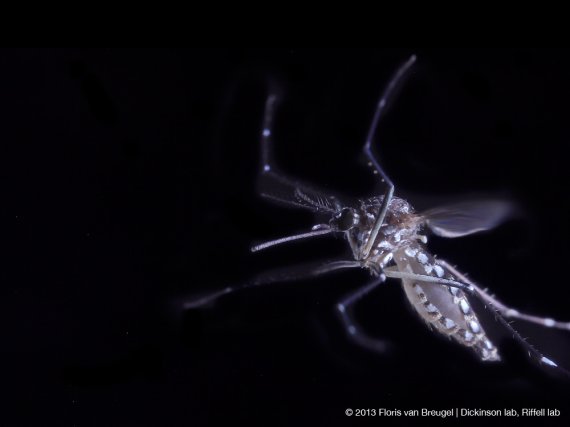Mosquitoes in flight move their wings up and down between 500 and 1000 times per second. In proportion to their size, that is absurdly fast, explains Muijres. According to him there is a kind of law in the animal kingdom: the larger the animal, the lower the wing beat frequency. But fruit flies, which are much smaller than mosquitoes, only beat their wings 200 times per second. So mosquitoes are the proverbial exception to the rule.
Why mosquitoes fly the way they do is not understood. We know hardly anything about the flight behaviour of the mosquito, explains Muijres. ‘Astonishingly little. And yet mosquitoes are the most dangerous creatures on earth. No other animal has had as many fatal victims as the mosquito.’ With his Veni grant, Muijres is going to study and analyse the mosquito’s flight movement. To enable him to do so, three highspeed cameras will be bought which can record the wing beat with several dozen images per beat. In order to do so, the cameras will have to be able to shoot an amazing 30,000 images per second. By way of comparison: the highspeed camera of the Wageningen Flight Artists’ project a couple of years ago could cope with 7500 HD images per second. The cameras are set up in a wind tunnel so they can record the wing beat from three angles (from above, the front and the side). This is guaranteed to produce spectacular images and has certainly never been seen before.
Muijres’s work is fundamental research. ‘I want to know how the flight system works. How fast does a mosquito fly, how far and at what wind speed?’ If you want to combat mosquitoes, knowledge about their flight is essential.’
Wageningen Veni grants
Florian Muijres is one of the seven recipients of Veni grants for Wageningen research. The others are Bob Douma (Crop and Weed Ecology), Annemiek ter Heijne (Environmental Technology), Jaime Hoogsteger van Dijk (Environmental Sciences), Michelle van Vliet (Earth Systems Science), Maarten Voors (Development Economics) and Marjon de Vos (Plant Sciences). The research funding body NWO awarded 152 Veni grants this year. In total, 1086 young researchers submitted proposals.

